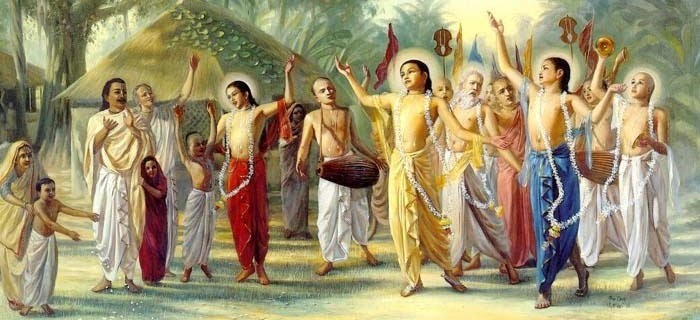 Hari is a name of Vishnu and, if you have not already guessed, nama means name. In fact the English word “name” comes from “nama.” According to Vaishnava theology the name of God is most sacred. This is also true in Judaism and Christianity. Most religions have some idea that the name of God is special. In Vaishnavism this idea is paramount. In fact the name of God IS God, literally. This is why you have seen ISKCON devotees singing and dancing to the names of God in the streets. By calling out the names of God they are spreading the names of God and thus “spiritualizing” themselves, the people who hear and even the street itself. Chanting the names of Hari is the main religious practice of ISKCON. Everything is built around this principle. In ISKCON chanting the names of God is done in two modes, one publicly and the other privately. When it is done publicly devotees sing the names accompanied by various musical instruments that may include all kinds of traditional instruments such as small hand cymbals, a harmonium (an organ type instrument), and tambourines. But non traditional instruments may also be used including guitars, conga drums, pianos and so on. There are no restrictions, other than what suits the situation. Private chanting involves a single devotee softy chanting on a set of beads called a japa mala. This is the same as a rosary. The principle behind chanting, whether in public or in private, is that the name of God is God and therefore by vibrating the names of God in sound, the devotee as well as all others who are in the vicinity of this sacred vibration, become spiritualized by associating with God in sound. Hari nama is the greatest form of purification. You may consider hearing the names of Gods as taking a spiritual bath. The heart and mind become cleansed of material thoughts.
Hari is a name of Vishnu and, if you have not already guessed, nama means name. In fact the English word “name” comes from “nama.” According to Vaishnava theology the name of God is most sacred. This is also true in Judaism and Christianity. Most religions have some idea that the name of God is special. In Vaishnavism this idea is paramount. In fact the name of God IS God, literally. This is why you have seen ISKCON devotees singing and dancing to the names of God in the streets. By calling out the names of God they are spreading the names of God and thus “spiritualizing” themselves, the people who hear and even the street itself. Chanting the names of Hari is the main religious practice of ISKCON. Everything is built around this principle. In ISKCON chanting the names of God is done in two modes, one publicly and the other privately. When it is done publicly devotees sing the names accompanied by various musical instruments that may include all kinds of traditional instruments such as small hand cymbals, a harmonium (an organ type instrument), and tambourines. But non traditional instruments may also be used including guitars, conga drums, pianos and so on. There are no restrictions, other than what suits the situation. Private chanting involves a single devotee softy chanting on a set of beads called a japa mala. This is the same as a rosary. The principle behind chanting, whether in public or in private, is that the name of God is God and therefore by vibrating the names of God in sound, the devotee as well as all others who are in the vicinity of this sacred vibration, become spiritualized by associating with God in sound. Hari nama is the greatest form of purification. You may consider hearing the names of Gods as taking a spiritual bath. The heart and mind become cleansed of material thoughts.
TheBlueLife.net
Welcome to the Writings of Shukavak
